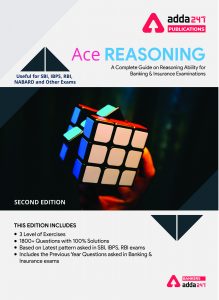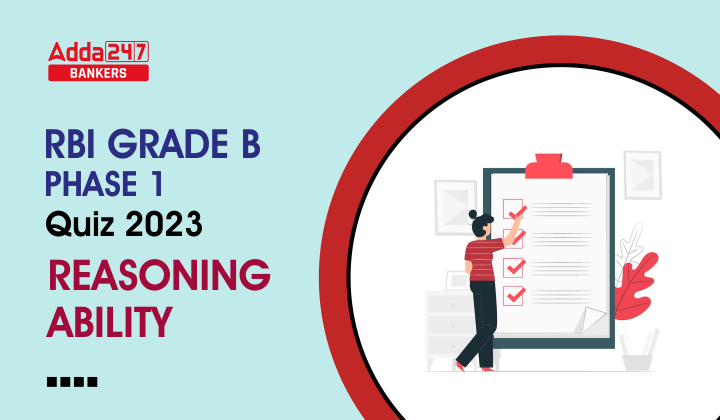Directions (1-5): Study the following information carefully and answer the given question.
In a certain code language,
‘Where to convert key’ is coded as ‘nm bm vm cm’
‘Close the flat’ is coded as ‘om km jm’
‘Convert our close’ is coded as ‘bm km hm’
‘Flat flip where’ is coded as ‘jm cm tm’
Q1. What is the code for ‘the’?
(a) km
(b) om
(c) jm
(d) cm
(e) Cannot be determined
Q2. What will be the code for ‘Key to flat’?
(a) nm vm jm
(b) nm om jm
(c) bm vm cm
(d) km jm hm
(e) Cannot be determined
Q3. What is the code for ‘Key close’?
(a) nm km
(b) cm km
(c) vm km
(d) jm hm
(e) Cannot be determined
Q4. Which word is coded as ‘hm cm km’?
(a) Where to convert
(b) Where the close
(c) The convert to
(d) Where our close
(e) Cannot be determined
Q5. What could be the code for ‘Convert far flip’ if ‘far’ is coded as ‘pm’?
(a) hm jm tm
(b) om im um
(c) km jm hm
(d) bm tm pm
(e) bm nm gm
Q6. How many such pairs of letters are there in the word ‘HORIZONTAL’ each of which has as many letters between them in the word as in the English alphabet (Both forward and backward direction)?
(a) Five
(b) Six
(c) Three
(d) Four
(e) None of these
Q7. Four of the following five are alike in a certain way based on their positions in the English alphabetical series and hence they form a group. Which one of the following does not belong to that group?
(a) RY
(b) KO
(c) FK
(d) NW
(e) PS
Q8. In a certain code, COMFORT is written as RPMDKMA. How would DISPOSE be written in that code?
(a) QGBMNOQ
(b) NMQBCDB
(c) CQMNQGB
(d) CVBQDMN
(e) None of these
Q9. How many are such pairs of letters there in the word ‘ECOLOGIST’, each of which has as many letters between them in the word (in both forward and backward directions) as they have between them in the English alphabetical series?
(a) None
(b) One
(c) Two
(d) Three
(e) More than three
Q10. In a row of 31 people, A is 9th from the top and B is 11th from the bottom. C is equidistant from both A and B. What is the position of C from the top?
(a) 14
(b) 16
(c) 15
(d) 18
(e) None of these
Directions (11-13): Study the information given below and answer the questions based on it.
Six persons A, B, C, D, E, and F are having different weights. C is heavier than F. E is only lighter than one person. A is heavier than D. F is heavier than D. B is heavier than A. The number of people heavier than A is the same as lighter than C. A is heavier than C.
Q11. Who among the following is the heaviest person?
(a) F
(b) B
(c) D
(d) C
(e) None of these
Q12. Who among the following is the lightest person?
(a) A
(b) B
(c) D
(d) C
(e) None of these
Q13. How many persons are lighter than A?
(a) One
(b) Three
(c) Two
(d) More than three
(e) None of these
Directions (14-15): Study the information given below and answer the questions based on it.
Six persons A, B, C, D, E and F are standing in a straight line according to their height. No two persons are of the same height. C is 170 cm tall. D is not the tallest person. F is shorter than A who is shorter than C and D. Only two persons are taller than E, but neither of them is C.
Q14. If A is 163 cm tall, then what could be the height of E?
(a) 160cm
(b) 171 cm
(c) 169 cm
(d) 168 cm
(e) 165 cm
Q15. If all the persons are rearranged alphabetically from left to right, then who will retain his previous position?
(a) E
(b) F
(c) B
(d) A
(e) C
Solutions






 GA Capsule for SBI Clerk Mains 2025, Dow...
GA Capsule for SBI Clerk Mains 2025, Dow...
 The Hindu Review October 2022: Download ...
The Hindu Review October 2022: Download ...
 ECGC PO Cut off 2025 Out, Check Final Cu...
ECGC PO Cut off 2025 Out, Check Final Cu...



